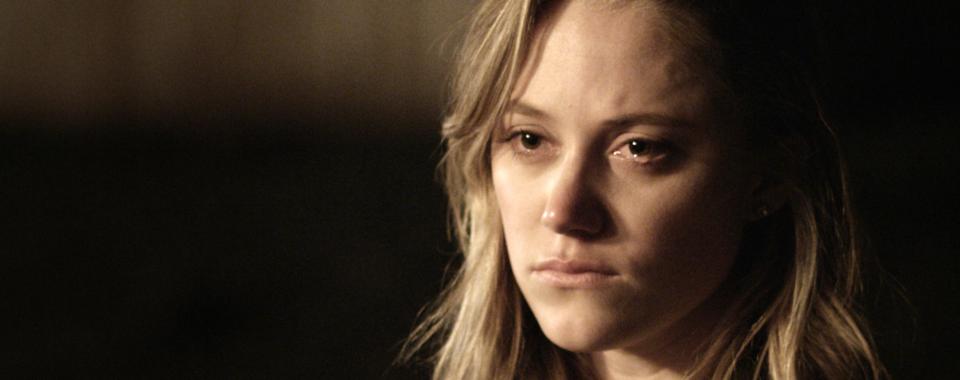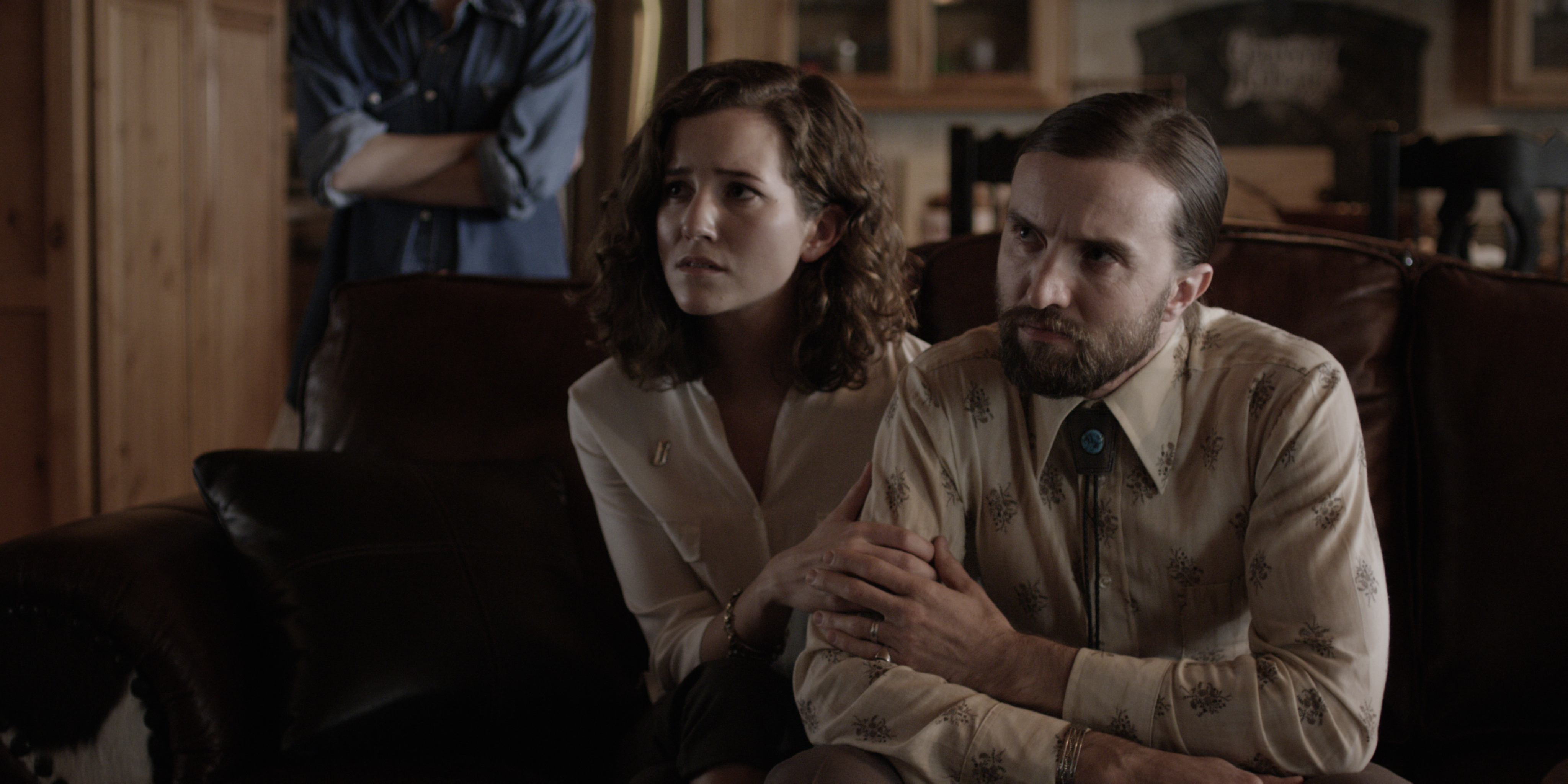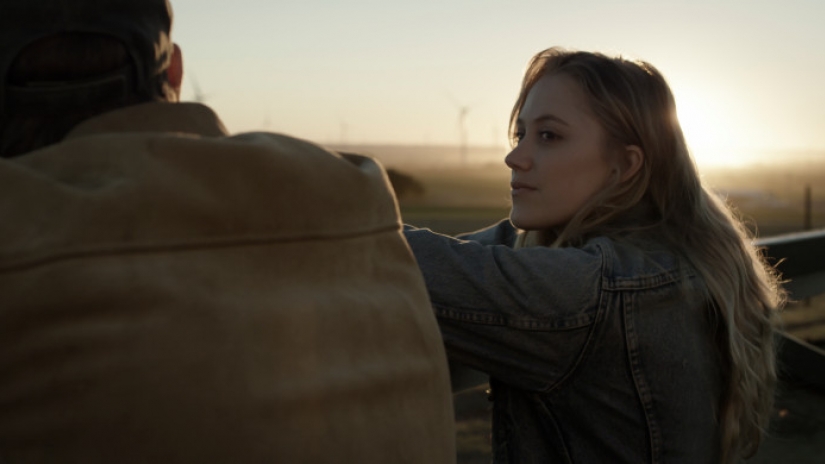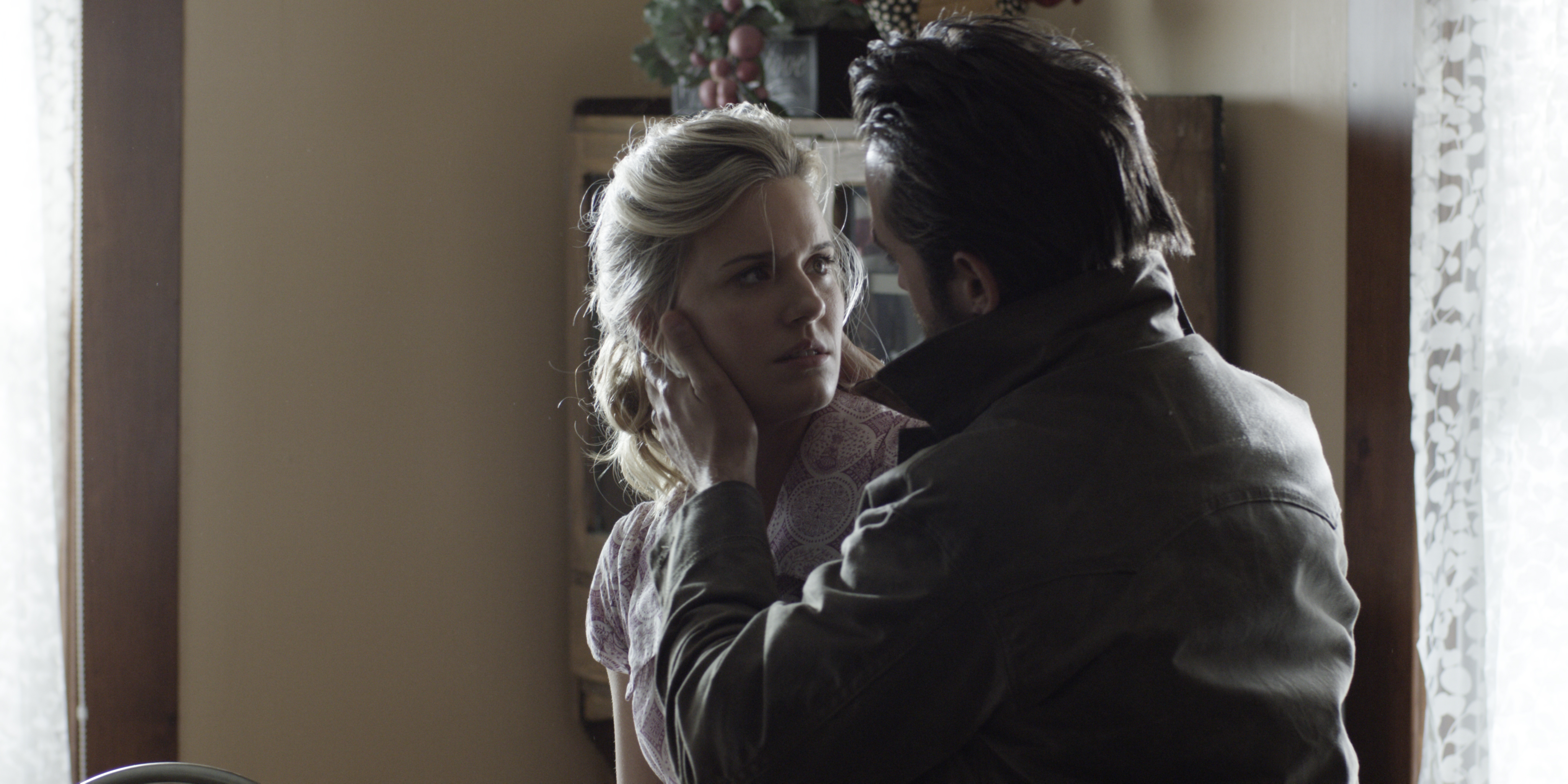Blake Robbins interview: The Scent Of Rain And Lightning, indie filmmaking
The director of the superb thriller The Scent Of Rain And Lightning talks to us about the making of the film and lots more...
As an actor, Blake Robbins will be immediately recognisable to fans of such TV shows as Firefly, Oz and the US version of The Office. As a director, meanwhile, he’s made his mark with gritty drama The Sublime And The Beautiful (2014), which he wrote and made for just a few thousand dollars.
His latest film is The Scent Of Rain And Lightning, a suspenseful and superbly-constructed thriller starring Maika Monroe, Maggie Grace, Bonnie Bedelia and Will Patton. Based on the novel by Nancy Pickard, it tells its story along two strands: one in the present, where a young woman, Jody (Monroe) is coming to terms with the news that the man accused of murdering her mother is being released from prison. The other strand takes place years earlier, and deals with the events leading up to that murder – here, Maggie Grace plays Jody’s mother, Laurie. The story moves almost seamlessly between these two periods, gradually unpicking the past as Jody drifts closer to the truth about her mother’s death.
On a larger budget than his previous film, but still working within limited resources compared to most mainstream films, Robbins and his team build up an absorbing and intricate thriller; Robbins mentions such recent indie hits as Cold In July and Blue Ruin as movies he enjoys, and it’s fair to say if you loved those, you’ll be engrossed by The Scent Of Rain And Lightning, too.
With the movie making its VOD debut in several territories on the 16th February, here’s what Blake Robbins has to say about the making of his thriller, how personal experience informed its tone, and his thoughts about the current crop of Hollywood blockbusters…
Congratulations on the film, which came out of nowhere for me – I didn’t go in with any preconceptions, but was blown away by it. I’d be fascinated to hear about the making of it from your perspective. I mean, going back to your first film [The Sublime And The Beautiful], that was shot in 12 days, wasn’t it?
It was. My first film, out of necessity, was a by any means possible, friends-and-family type of a thing, where I just turned 20 years of relationships in the business into this passion project. Fortunately for me, the economies of making those kinds of films had become such that you didn’t have to mortgage your house to do it, although some people do.
You just raise $30,000 by any means possible, and pull everyone together. That was the first film. That film is what led to the second film – it showed in a film festival in Kansas City, and the two writers of this screenplay, which they had adapted… they had seen my first film and loved it, and reached out to me, wanting to share the script they’d adapted from a novel.
It was a New York Times best-selling novel – it wasn’t the top five, it was a little further down the list, but certainly, there was a PBS talk show that was talking about books that had to be made into a movie, and one of the ones they were discussing was [The Scent Of Rain And Lightning].
Casey, who’s one of the co-writers and producers on the film, his wife picked up the book and read it, and said, “I absolutely think this should be turned into a movie.” They were knew enough in their writing career that they were looking to see if they could do an adaptation. They were drawn to the material, and serendipitously, the writer lived only a couple of miles away from [Casey]. So they met for a coffee, and he said, “Look, I don’t have any financing to bring to it” – I think they did a one-dollar deal or something like that, but they just clicked creatively, and she said, “I’d love to see it as a movie one day.”
So they created this adaptation, and I loved it. I was drawn to the circumstances of the characters, the world, the strong female protagonist in a patriarchal reality. I was drawn to the fact that you felt that it was a novel when you read the screenplay – every character was fully realised. Sometimes when you get a large ensemble, some of the characters feel a little thin, and this didn’t have that.
My cinematic tastes began back in the 1970s, when this kind of movie was made all the time, with George Stevens and John Ford and Elia Kazan. I thought this was a great version of that. That movie’s not coming out of Hollywood anymore, so what can we do to put this together? How do we put a fresh, independent spin on it?
The more recent movies that I love are Cold In July, Animal Kingdom and a Jeremy Saulnier film like Blue Ruin, and I thought this would be a good mash-up of those two types of films. I covered a lot of ground in that answer didn’t I? [Laughs]
No, that’s perfect! And you assembled an incredible cast here – Maika Monroe, Maggie Grace, Bonnie Bedelia, Will Patton. But did you find, during the casting process, that there’s a certain hunger among actors for a script like this?
Yeah. I’m gonna say that, at the time it was a little frustrating but in the end it was absolutely necessary for the making of the movie, people were either downright away and excited, or it wasn’t for them and they removed themselves from the process. If I’m being completely honest, we did come across some talent out there that didn’t want to be part of such a large cast. For their own career reasons, or possibly their representation or whatever, they wanted to be one of three: a central star of the film.
But I didn’t try to convince anybody that it was for them. When you’re making a small film, things go in a non-traditional, non-linear kind of way. Maggie Grace and I share a business manager, and she’d reached out to say she’d seen my first film and had enjoyed it. She said she’d be interested in helping me in my career, which was a phenomenal thing I had in my back pocket. So one of the first things I thought [with The Scent Of Rain And Lightning] is that this is a role I haven’t seen Maggie Grace play before, that I thought she had the chops for. I thought she could do something special with it.
We also started talking about her interest in becoming a producer, and on a film like this, it was an opportunity. She’s incredibly bright and intelligent, and she’s probably going to have her own film company one day, so this made sense for her.
With Jody, we were looking for someone special, and I quickly zeroed in on Maika, because I thought she was a perfect match with Maggie. I thought, this girl could be the grown-up daughter of Maggie Grace. When casting a film like this, people get very interested in how it’ll ultimately perform, based on the value of those actors. I think that’s important, but central to me is that I want to believe that these people are all connected to each other and make sense. So many movies stumble when they start chasing dollar signs – they start to reach out to people, and not to throw him under the bus, but then Jack Black ends up in my mid-western noir, you know? Because he’s worth so much foreign value and those kinds of things.
Luckily I was working with producers and investors who gave me some leeway to go and get a Brad Carter, who feels so authentic to that world. He plays this really incredible part, but he’s not such a huge celebrity that it takes you 20 minutes into the film to believe him in the part. If I cast Robert Pattinson, who I’d love to work with, and who could have probably pulled off that role, it would have taken the audience a while to reconcile everything they know about Robert Pattinson with a role like Billy. I just didn’t want to make that movie – I wanted people to be enmeshed in these people and believe in them.
So it’s a case of working with known quantities like Will Patton and Bonnie Bedelia, but they’re such character actors that we allow them more space for that kind of role. When we see them, they all make sense together. In fact, on set I realised that Bonnie and Will had actually played a husband and wife before, like 20 years earlier. Their relationship looked like that to me, it made sense.
Once Maika, Maggie and Brad were in place, it was really easy – sort of like dominoes falling at that point.

You probably get asked this a lot, but I’m guessing your experience as an actor on TV and film has given you the experience to move into directing. Especially when it works quickly on an indie film.
Well, for better or worse, it was my film school. My career as an actor was my film school, so I haven’t learned what other directors have about lighting or lenses; these are things that I have to fill in as I go about putting together a film. Lyn Moncrief, who shot both my films, he and I, as far as I’m concerned, he’s a filmmaker that just happens to specialise in the camera department. He’s in my casting department, in my sound department. What I rely on is a hundred or more experiences of what I liked or didn’t like. About the process, about the way it’s handled, or the way it comes together.
I’ve always had my own thoughts about storytelling and the movies I respond to. Someone once said, “The director’s the first filter for the rest of the world that will see that film.” So their responsibility is, for better or worse, what does he respond to or not respond to? Both in production or in the editing room, or the mixing room. This film’s very visceral in its sound and score, and that has a huge impact – the mixing room was very important to me, and it’s often neglected in small films.
One of the films I loved about the film was the way it’s edited and the way the past and present blend together so seamlessly.
Well, I appreciate that. I said in another interview, I made the film for a certain kind of audience. There are people like me who grew on Chinatown, who trusts when I’m in good hands and wants to pay attention, do you know what I mean? You know, I’ll go to a popcorn movie that’s made for the masses, too, but what about audiences that get neglected – who want a film they can carry with them for a few weeks? There’s an audience out there, I hope, who are like me, who are film lovers.
Moving back a bit to the making of the film, I said right at the beginning, “There are very few flashback films that I’ve seen and loved.” For me, what often happens is, I feel restless in one part of the film or the other if I’m watching a flashback movie – I want more of one time and less of another. So I started thinking, how do I address that? Because it works so well in the book. You’re dealing with a large time-span, and you’re hearing the thoughts of the protagonists.
In film, unless you use voice-over – which I also don’t always respond to, though I love a film like A River Runs Through It, but that’s an exception. Too often, it becomes an interruption for my own thoughts as I’m watching. So we weren’t going to have voice-over, and instead of it being a flashback movie, I thought, what if it’s a movie that happens to take place in two time periods that are so inextricably linked, they have to co-exist? Then that became very interesting to me. It wasn’t a flashback movie anymore – it was just a movie that happened to exist on two time periods.
I’ll tell you a little bit of a weird story, but it’s an insight into how a creative person – if I may call myself that – and puts it into a film. My mother and my father, maybe five or six years ago, moved back to the town that my mom grew up in when she went to high school. By coincidence, when my father went to buy a house for them to retire to – they’d had this life, he’d been in the navy, they’d met in Germany – and when my mom looked at the house, she said, “Oh my god, that’s the house I lived in when I was in high school!”

Unbeknown to her, he’d bought the house that she lived in. So they moved into this house, and life interjects, and my dad passes away a few months later – tragic, sad, sudden. I’m talking to her during this time, when she’s having this out-of-body experience of her life, she’s dealing with so much grief, and my mom shares with me a conversation: “It’s like the whole life that I had when I left this small town was a dream. Now I’m back in this house, and it’s like none of that happened.”. Even though it all did – there were children, 40 years or more.
When she said that, something stirred inside me. I have felt that feeling too, but not as profoundly as she had. Well, it’s in the movie. We have these two time periods where everyone’s life changed. A murder happens, and then a man’s released. Twelve years went past, and yet, in this movie, it’s as if nothing ever changed. It’s as if… life is so cyclical sometimes, and these things take us right back. We think, “What was that? What was the last 10, 20 years about?”
In a weird way, maybe not even consciously, I kind of put that into the movie. Because we’ve all felt that – we’ve all felt the nature of time. So I broke some cinematic rules to do that, like show you the same moment without changing it at all, only letting the amount of information you have in your head about what happened change how you see that same scene again. Like, the editors, who know the rules of cinema, said, “I don’t know that we’re allowed to show people the same moment exactly. It feels weird to me.” I said, “It feels to me in a way that I like, because of this thing,” and when I shared it with them, they’d say, okay. I get it.
So in a weird way, my lack of film school allows me to break some rules – I just people around me to let me know. “Don’t just let me do it – challenge me on it and let’s see if we both agree!”
I think you’ve hit on something there. That dreamlike sense of time passing is what fascinated me. And it’s what reminded me of Nicolas Roeg’s film, Don’t Look Now.
Yeah! I have to go check this out. When you wrote that I thought, “I’ll have to check that out”. I wish I knew it.
It’s a totally different film, but Roeg has a similar sense of one time period flowing into another. I think that’s why people love films, actually, even if they don’t realise it: films mimic the way we dream, the way we remember.
Absolutely. It depends on the filmmaker and the people they put it together with, because we’ve all seen films that don’t pass our own authenticity test. Like, we feel as though we’re being lied to about something – the way a film looks, the way the characters behave. It can be anything. Many people will see this film and not respond to it the way you or I responded to it. I had to work with people and be okay with that. I’m not going to argue with someone who says, “Yeah, that didn’t make any sense” or, “That didn’t need to be there.”
Like the sequence where the Flaming Lips are playing on the television. I wanted to use the technique of film to make the audience feel Jody’s mindset as much as I could. The nausea, the alcohol, the turning upside down of her world. So I was using cinema to get you as close as I could to the way she was feeling.
Again, that talks to what you were saying about it feeling the way we dream. My intention was to get as close to that line as I could, and some people will respond to that and others won’t. The beauty of small films is, there are less people to say, “No, you can’t do that”!

It seems to me that a lot of big films recently, that cost tens of millions of dollars, will have a matter of months or just weeks for post-production at times. They’re doing reshoots until mere weeks before a film’s release. As another filmmaker, I wondered what your opinion on that was.
That’s a world I haven’t been privy to just yet, so I’m commenting as an outsider as much as anyone else. But I think history has shown that filmmakers who learn to make movies by solving their problems creatively instead of financially eventually become the filmmakers most of us respond to. And that works at any level. Because it’s easy, when you have unlimited resources – and I do mean unlimited, because with these films, the numbers become Monopoly money. Without being cynical about it, they’ll just go back and get more resources to sell the consuming public on the fact that they’ve got a hit no matter whether they have a hit or not. So they’ll spend more money on making us believe that this is a film we have to see.
It’s only a year or two down the line where we go, “Why did everyone see that? Why did we rush to that?” So it’s really an apple and an orange comparison in the film industry. There’s this thing over here, which is about how many eyeballs we can get to go see it. Less important than how good the film is is the timing of the film. We’ll do whatever it takes to time the film for the appetite for the movie. So if we select a Christmas 2018 as when this movie’s gonna hit, we’ll hit that no matter where the film is. We’ll just throw as much money at that problem as we can.
Take a film that came out a couple of years ago, that pretty much everyone can agree was pretty crappy: it made money. Okay, it didn’t meet expectations, didn’t knock it out of the park, but the business of it can’t be criticised – when all is said and done, when all the markets have been sold and all the TV rights come in, and all the DVD sales, they threw enough money at the problem of convincing people to see this movie that, by the time it was over, some people got very rich on that film. Not everybody, but some people. It’s kind of a dirty secret that it doesn’t matter how good the movies are. If they’re good, that’s an added benefit. They can make a lot of money off really bad films – globally.
A buddy of mine did a film festival, and he said, “We have to remember as filmmakers that we’re artists. We just have to remember that we work in a medium that’s really expensive, so all these other problems come with it.” But for some of those movies, it’s just business. It’s the art of the trailer: you can make any movie worth seeing with good artwork and a good trailer. In fact, most movies get sold to markets with the trailer and artwork, not the movie.

From that distribution point of view, what are your thoughts on films going to the cinema versus Netflix? I don’t know if you saw the story of Annihilation, Alex Garland’s latest film, and Paramount put it straight to Netflix in several territories.
It’s becoming very common. Again, I’m only looking it at it as an outsider, but one, I think it’s a reaction in part to the polarisation between really big films and really small films. Much like American society: the middle class is going away. You either have money or you don’t. So I think this is the reaction to that: where is the middle class? The middle class is in these mid-priced films, and it simplifies everyone’s life right now to let someone like Netflix bear the burden of a film’s finances. Because otherwise you’re chasing your dollars in every market – you’re trying to make a thousand deals instead of one deal, so by definition, when does that time and energy on the part of the filmmaker not become worth the money? Filmmakers just want to make movies – they don’t want to have to spend their time figuring out how much they’re going to get theatrically in Singapore, you know?
Then you have this global marketplace, Netflix, that says, “We’ll take care of that for you.” It’s like Coinstar – you pour all your change into the machine, print out your receipt, and then they give 85 percent back in cash. So they’ve taken 15 percent for the convenience of what you just poured in. I think that’s Netflix! It’s like Coinstar. If you don’t want to spend your life getting 100 percent, you just want to pour it in.
So as a director, have you got anything lined up next?
I have a small film that I’m just waiting for a greenlight on. The thing is, if I wait for a greenlight, I’m running contrary to my own opinion, which is that you don’t wait for a greenlight, you just go. Then the greenlight comes from the momentum. But I like the people I’ve partnered with, and I’m kind of waiting for them to say whether they want to do it or not.
So that’s one thing. The other thing, I met a gentleman on the film circuit who shared a script with me that I was blown away by. Very shortly he should be giving me a rewrite based on some notes we discussed. I’m really excited about that script: it’s another mid-west film. I love the characters – it’s sort of a modern-day Bonnie & Clyde movie. I think this guy’s a fantastic writer. But you know, I didn’t know The Scent Of Rain And Lightning was going to be my next film after Sublime – people asked me what was next, and I thought it was going to be this other film. That film didn’t happen, and Scent came together pretty quickly. So while I have these two irons in the fire, who knows? [Laughs]
Blake Robbins, thank you very much!
The Scent Of Rain And Lightning is available to view on iTunes now.